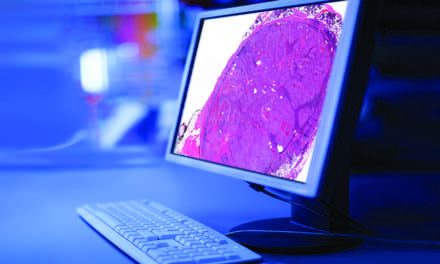Proscia Inc and Proteocyte AI, both in Toronto, Canada, have signed an agreement to integrate Proscia’s technology with the Straticyte test for predicting the risk of progression to oral cancer. Proteocyte AI will leverage Proscia’s Cloud-based platform to orchestrate workflows of patients, doctors, and laboratories, enabling Proteocyte AI to offer a more comprehensive solution.
“Oral cancer can be a devastating disease,” says Kevin Lung, DDS, MSc, FRCD(C), an oral maxillofacial surgeon at Kingsway Oral and Maxillofacial Surgery Clinic in Edmonton, Alberta, Canada. “We know that early detection can make the difference for oral cancer patients, yet we’ve had a gap in technology in terms of predicting which oral lesions will transform to oral cancer. Straticyte provides us with more information so that treatment plans can be further personalized and outcome for patients may improve.”
Proteocyte AI is focused on combining artificial intelligence and protein biomarkers to determine a patient’s 5-year risk of developing cancer. The technology predicts which patients are at risk to develop cancer before they actually have cancer.
Proteocyte AI’s Straticyte test predicts the progression of premalignant oral lesions to invasive oral cancer. Straticyte enables healthcare professionals to customize patient treatment, improving outcomes for patients at risk for developing cancer, while reassuring those patients who have minimal risk of disease progression. The test can be easily incorporated into clinical practice, as no additional tissue samples are needed for assessment.
“Straticyte provides information to healthcare professionals that can make a real difference,” says John Davis, president and CEO of Proteocyte AI. “We believe our test will enable earlier treatment of patients, contributing to the patient’s quality of life and reducing healthcare costs. The Proscia platform is a good fit for Proteocyte AI as we move to our next stage of development, focused on commercialization and market expansion to fuel global growth.”
“This marks the first time a third-party algorithm integrates into Proscia’s platform alongside our algorithms and workflows,” says David West, chief executive and cofounder of Proscia. “Our vision has always been to build a flexible platform that is hardware agnostic and lets third parties plug into our modules. Proteocyte AI and Proscia are mutually committed in the fight against cancer, and the merging of our technologies will help pathologists and doctors give more effective prognostic assessments than the current standard of care.”
Proscia’s Cloud-based platform offers an opportunity to combine the whole-slide images of digital pathology with other sources of data—such as laboratory information management systems, electronic medical records, laboratory data, and radiology images—and then apply algorithms to provide pathologists with a more complete, computer-assisted view of the disease processes present in a tissue sample. Such algorithms can identify complex histological patterns such as tumors, classify cancer subtypes, and even predict outcomes with a high degree of accuracy. These building-block capabilities can be deployed in pathology workflows for precision screening and automated triaging, and used as image-based assays as corollaries or in complement with their molecular counterparts.
For more information, visit Proscia and Proteocyte Diagnostics.





